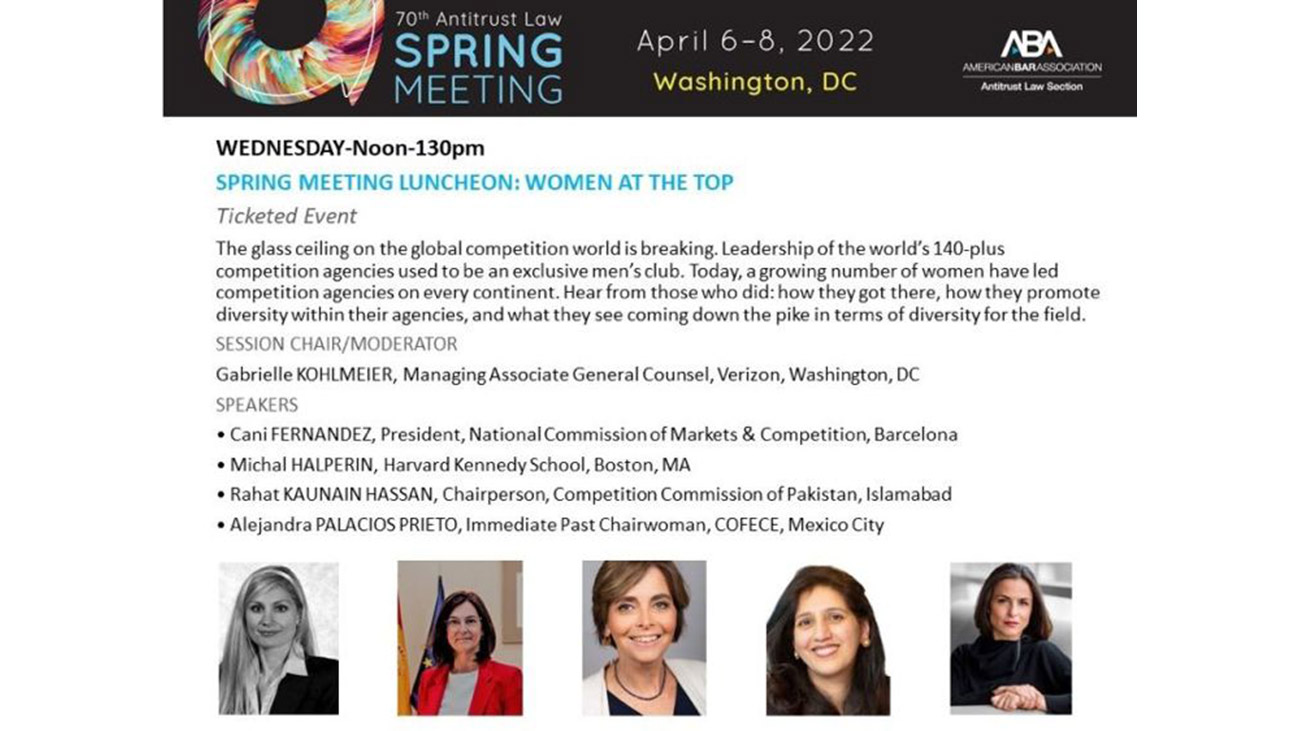Event Detail



The Chairperson participated in the American Bar Association (ABA)’s spring meeting ‘2022. On this occasion, she also gave an interview to Mr. Russel Damtoft for the Antitrust Magazine Online on April 7, 2022. The full text of the interview can be downloaded from the Commission’s website. Here is a summary of the interview. The Chairperson talked about Pakistan’s competition regime, the Commission’s most newsworthy accomplishments under her leadership, and her own professional journey. Touching upon the history of the Commission, Ms. Rahat Kaunain Hassan explained that in 2007, the Competition Ordinance was promulgated to replace the Monopolies and Restrictive Trade Practices Ordinance (MRTPO). It is a state of the art law having some new striking features such as search and inspection, forcible entry, enhanced penalties, leniency, application of law to all undertakings including governmental and regulatory bodies and most importantly the administrative and functional autonomy of the Commission. While discussing the initial challenges, the Chairperson said that from 2007 to 2010, the Commission had to struggle for establishing its writ, striving to secure permanence for the law while enforcing the same against powerful lobbies. She said the debate on the constitutional vires of the Competition Law had been pending since 2008–2009 before the Courts, and it is only in her second term as Chair that the Commission finally received the endorsement with respect to the federal legislative competence from three High Courts: the first being the Lahore High Court in October 2020, followed by the Islamabad High Court in 2021 and from the Sindh High Court in 2022. This was so critical and much awaited. However, the question needs to be finally settled by the Supreme Court of Pakistan in pending appeals. While narrating her journey and accomplishments under her leadership at the Commission, she said that in her first term as Chair, from mid-2010 to mid-2013, the Commission did some solid work. Apart from the transition of Law, the Commission paced up the enforcement by passing some landmark decisions including the International Clearing House (ICG) Order in the telecom sector, the Urea Order in the fertilizer sector and the first ever and the only Leniency decision in the matter of cartelization in the power sector, she added. On the role of the Commission and applicability of the Competition Act, 2010, the Chairperson said that there is a general misunderstanding that the Commission is a price regulator, which is the indeed antithesis of competition. We cannot and do not regulate prices; we regulate the anti-competitive behavior. At certain times, we have had this conversation with the governmental agencies where we were asked as to how CCP can help control pricing issues. While the government may have its own rationale and objective; repeatedly, we have maintained that fixing and controlling prices do not help markets. It has a distortionary effect on the supply demand equation. On question of cartel enforcement, the Chairperson said that since 2007, the Commission has targeted several cartels. Out of around 70 billion Pakistani rupees in penalties imposed by the Commission since its inception, the highest and the larger sums have been imposed against cartels during her terms as Chair. She said that to name a few, the Commission has unveiled cartels in the telecom, poultry, milk, cement, sugar, banking, automobile, tractors, chartered accountancy, and stock exchanges. These are extremely important segments. She mentioned that the highest ever cartel penalty has been imposed in the sugar sector, where the Commission imposed a fine of PKR 44 billion on the Pakistan Sugar Mills Association and 82 member sugar mills. Moreover, over a dozen investigations are currently in progress. These include bid-rigging in the power sector, essential commodities—edible oil and ghee and wheat, the construction sector, such as glass and steel, the financial sector (T-Bills auction), the media industry, e-commerce (food aggregators) and the automobile sector (cars), she added. Responding to a question on deceptive marketing practices and advertisement, the Chairperson said that she recalled a slogan that she had coined in the past: “show what you sell and say what you mean.” This is what we are trying to achieve through the enforcement of Section 10, she remarked. On merger regime progress, the Chairperson said that the Commission has improved its online merger filing facility, and further improvement is underway. She said that in 2021, the Commission has processed ninety-four mergers, including a Phase II review. On Competition Advocacy, the Chairperson said that advocacy is our statutory obligation and I also believe that enforcement is the best advocacy. The Commission engages in advocacy through media, press releases, issuing policy notes and holding public hearings. All our decisions, enquiries and policy notes are required by law to be placed on the website. After a gap of seven years, the Commission has resumed holding the Competition Consultative Group (CCG) meetings, which is an informal ‘think- tank’ with stakeholders from public and private sectors and governmental bodies as members. We have recently taken a new initiative, whereby we intend to maximize dissemination of our work through infographics. We have started doing it for all our decisions, all our policy notes, and we will gradually do the enquiries as well, she said. On a question of gender and acceptability of women leadership, the Chairperson said that she always had a gender-blind vision. “I think it is because of that I have reached where I am. I believe I do not hold this office simply because I am a woman,” she said adding, “but to me, the more important question is what can I do in this position?” Interestingly, until recently, three out of four Members were females, and we have 50?males in the Cartel and Trade Abuse Department, who actively participate in search and inspections or forcible entries. She said that we have a female-empowered Commission. I believe, if one wants to break stereo-types about Pakistani women, CCP is a great place to start, she remarked.

© CCP 2024, Competition Commission of Pakistan ©All rights reserved